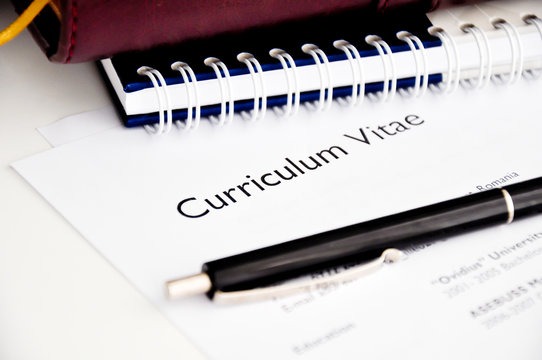
Top Tips for Creating a Standout CV That Gets Noticed
Publish Date: 2023-08-29
Many people dread writing their CV, but it should be a fulfilling task! It is a great document listing all your achievements and virtues. Who knew you were so brilliant?
Your CV should contain:
- A brief summary
- Work experience and/or employment history
- Education history
- Extracurricular achievements
- Contact details
- References
Not everyone may have been employed before, or maybe you don't have any work experience (you may want to check out our Ultimate guide to writing a CV with no experience if this is you). No two CVs are the same, just use our structure best you can.
Check out guidance for each section below:
Brief Summary (also called a personal statement or personal summary)
Imagine the first sentence of a book - if it's boring are you going to finish the novel? No.
You know what an Insta or TikTok bio is, so you’ll be familiar with that character limit only too well. It's important to make an impact quickly whilst getting across who you are (no we are not saying use an emoji in your Personal Summary!).
Tip 1: You want this section to be interesting but it should be brief and to the point. You want the recruiter to be hooked in the first 10 seconds on why you are a skilled-brilliant-match for the company. Don’t open with a cliche, the generic “I am so passionate about engineering” is going to get them flicking to the next candidate’s CV. You need to keep this section factual and concise. Avoid buzzwords or ‘fluff’.
Tip 2: This should be located at the top under your CV title. This will be the first thing someone sees and reads.
Tip 3: Aim to split this summary into 2 sections: who you are and where you want to be. Aim to keep each to only a sentence (or two). Two flowing, factual sentences is optimum.
Tip 4: Possibly the most important tip of them all, this personal statement should be tailored to the individual job you are applying for. I will say this again for those at the back, this must be tailored. If you have read our tacking job applications guide, you will already know how important the job description and person specification is - use these as a ‘checklist’ to ensure you have included key information.
Work Experience and/or Employment History
Employers will read this section to decide if you have the skills required to fit the job. If you haven't done any work before, include volunteering here. If you have no experience, go and read our guide on How to write a CV with no experience.
Tip 1: It is here that you need to prove you have the skills required to fulfil the ‘job role’ (we spoke about how to dissect a job description in the ultimate guide to tackling job applications here). Use the job description and job roles like a checklist, make sure you include examples of work experience where you have demonstrated your specific capabilities.
Tip 2: If you have volunteered in a care home, but you’re applying for a totally unrelated job in accounting, still include this experience! Even though it might seem irrelevant, think of the skills that overlap. Did you have to work in a diverse team during stressful times? This is a soft skill that is very transferable. Always look for an overlap, draw attention to your experience that addresses items on the job description.
Tip 3: Include specific achievements, did you win employee of the month twice for the highest volume of sales? Or for best customer service? Including factual information gives the employer a clear indication of your ability.
Education history
A few employers no longer ask for your education history and have instead adopted a more holistic hiring approach. This is a really positive change we are seeing in the industry as apprenticeships and school leaver programmes are on the rise. Employers are beginning to see that there is so much more to a person than their GCSE results or Physics degree.
However the majority of recruiters at the moment still do fancy a strong academic foundation, so we will include this section for now (hopefully one day we can delete it!)
Tip 1: You should briefly list all of your educational qualifications. Employers usually expect to see grades in this section.
Tip 2: If this application is for your first ever job, then your academic achievements are your biggest demonstration of ability. Even if this isn’t your first job, you still want to pull out and highlight your greatest achievements. If you won the Science Prize last year, include this with a short description on what amazing feat you created. Or if you achieved the highest grade in your GCSE Geography exam in your year group. Include the points that make you stand out from the crowd.
Tip 3: If your education achievements are a little short, don't lose hope. You can include any other school achievements here too such as if you are Prefect for your house, or the Science Champion at open evenings for the department. These things demonstrate other very important soft skills.
Extracurricular interests and achievements
This section allows you to show off a little more personality.
Many of us will have other hobbies, if you can demonstrate these have developed any soft skills then include them.
Use the “job specification” checklist you will already have created to ensure you are including things here that will aid your application and not hinder it. If they have asked for an outgoing team player that is confident in communicating with the entire business, then putting down a hobby such as reading sci-fi books may not be useful for your application. However, representing your school in the Rugby team would be great to include. For example, what key roles have you taken on, have you helped coach, referee or captain some matches? If you have travelled the world during a gap year, include this here with any key achievements, if you volunteered abroad, even if just for a day.
Contact Details
Tip : It goes without saying that the contact details you provide must be sensible. Don’t include your pinkwatermelon101@hotmail.com email address. As we said in our Ultimate guide on how to smash job applications, treat each part of the application process as a mini interview so be professional at all times.
Tip 2: Include a clear ‘call to action’ at the bottom of your CV such as “Please contact me on 07123456789 or email me on sensibleemailaddress@hotmail.com”.
Tip 3: Actually double check you have included your correct email address and telephone number.
Tip 4: Do not include your full address, many recruiters are no longer allowed to keep this information on file. An approximate area such as a county or town is fine.
Tip 5: Do not include personal details such as birthday, ethic origin, or sexual orientation. Many application processes are blind to ensure there is no discrimination. Also, do not include a selfie…
References
Often a company will not hire you until your referees have been contacted and the references obtained. This can be a lengthy process.
Tip 1: To save time and effort, contact your chosen referees in advance and check they are happy to be contacted - this way they will be expecting an email in their inbox.
Tip 2: Never share your referees personal details without their consent, instead include just their name and job title on your CV.
Tip 3: We recommend contacting 3 referees in advance, as many companies require several.
General VIT (very important tips):
Bonus Tip 1: The human brain has a negative bias, it's how we are hardwired. When giving examples of your experience use *positive* language. An example of this would be: “I have an understanding of basic computer coding” is far better than “I don’t have knowledge of complex coding but I do know the basics well”. In the latter statement all you focus on is the negative statement. Use “I can” rather than “I can’t” and “I do” rather than “I don’t”.
Bonus Tip 2: Spend some time designing your CV, I don’t mean go wild on PowerPoint or Canva to make this a masterpiece, in fact quite the opposite. Choose a format that clearly separates each section into clear, neat blocks. Use an easy to read, plain font - arial or Times New Roman are sensible. Don't use a massive font just to fill a page, or size 6 font if you have too much information!
Bonus Tip 3: If this application is for a school leavers job, apprenticeship or grad role then keep your CV to 1 page. If you absolutely have to then 2 pages is okay, but it would have to be an actual gold mine of amazing achievements to warrant spilling onto that second page. As mentioned before, keep fluff to a minimum and keep your CV as factual and concise as possible, bullet points are your friend.
Bonus Tip 4: Finish your CV then proofread it. Print it out, then proofread it again. Typos in a CV shows poor attention to detail, afterall you have plenty of time to make it perfect.
Bonus Tip 5: Once your CV is perfect, save it with a sensible filename. YourNameCV_Company.PDF is a good choice. It also shows you are not sending out a generic CV to millions of other companies.
Bonus Tip 6: Whilst we’re here, make sure you save it as a compatible file type, not everyone uses Microsoft word or Pages on Mac. We recommend saving as a PDF if possible. If not then a word format is fine, but just make sure you have emailed it to yourself on several different devices and make sure it opens correctly.
Bonus Tip 7: Although we have done our best to help the majority of you with CV preparations, there are some industries that swim against the current. Some design and marketing roles may like a masterpiece CV with creative flair chucked in by the bucket load. You may also find some new-age startups asking for a video CV on TikTok or YouTube. Use common sense, but if you have already read our Ultimate guide on how to smash a job interview then you will already have dissected the advertised job role and it should be clear whether they are looking for a traditional CV.
Don’t include a photo of yourself
Different countries have different requirements, but in the United Kingdom, including a photo isn’t the norm. Just don’t do it.
Lastly, GOOD LUCK. We really hope our Ultimate CV guide has been useful to you.
If you need help to finding your dream role check out our Job Portal or connect with us on LinkedIn. Follow us on social media to make sure you don't miss out on our upcoming opportunities with some of the biggest FTSE 100 companies.
Young Professionals UK, founded in 2015, are leading school-leavers experts whose mission is to bring better and more vibrant opportunities to students who need them the most. They have already helped thousands of students accelerate their careers with apprenticeship and work experience programs alongside some of the world’s leading companies. To stay tuned for future student or employer opportunities visit https://young-professionals.uk/ or https://www.instagram.com/youngprouk
